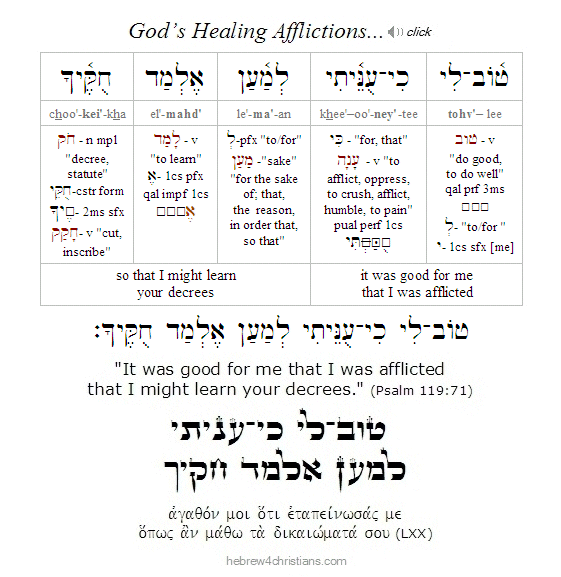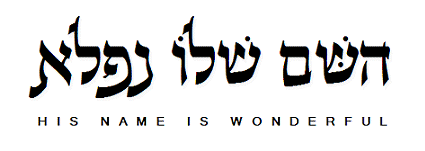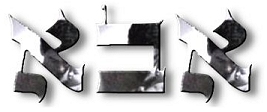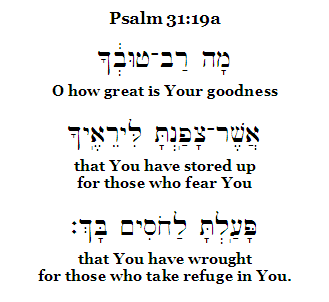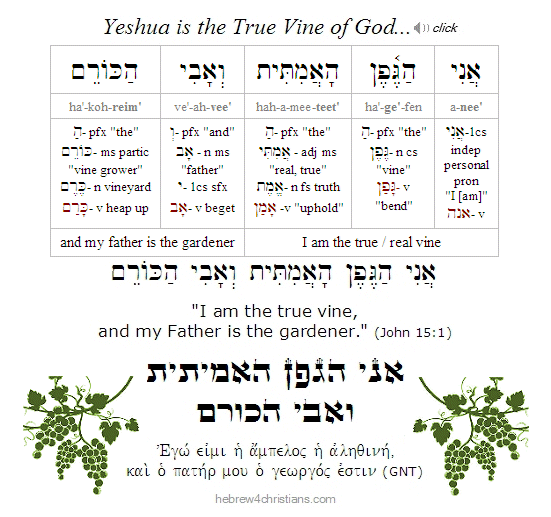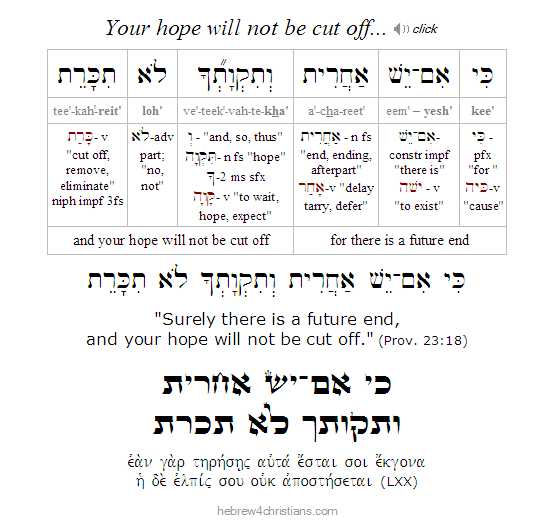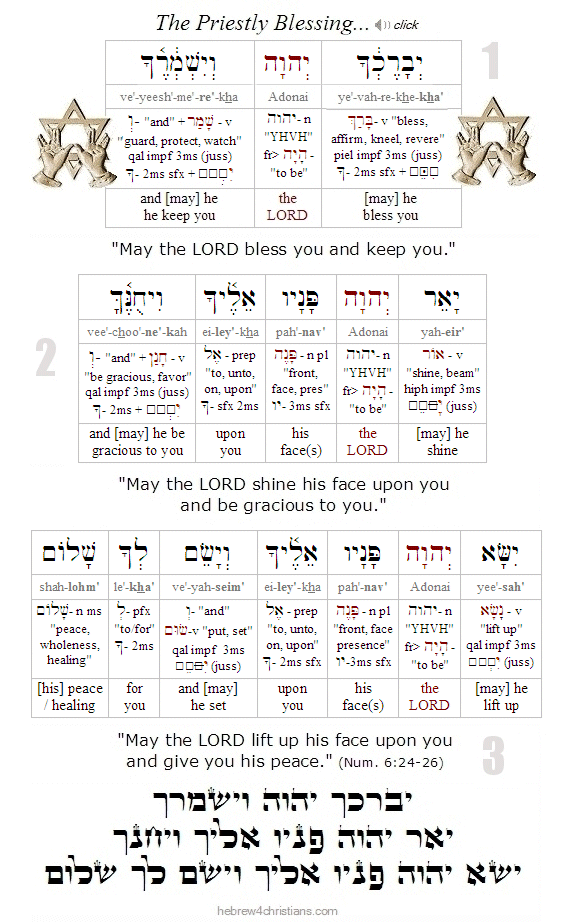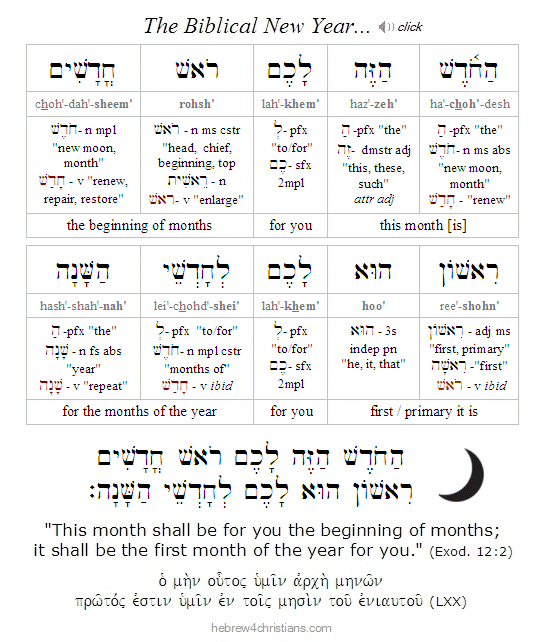|
January 2024 Updates (continued)
Note: If any page content appears to be missing, please refresh the page...
The Spirit of Hope...
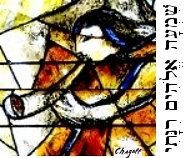
[ "You don't realize Jesus is all you need until Jesus is all you have." - Tim Keller ]
01.05.24 (Tevet 24, 5784) When Moses proclaimed the good news of God's forthcoming redemption for Israel, the Torah states that the people could not listen because they were "short of breath" (Exod. 6:9). Interestingly, this phrase (i.e., mi'kotzer ru'ach: מִקּצֶר רוּחַ) can also mean "lacking in spirit," as if in a paralyzed state of hopelessness. But how did the people become so downhearted? Had they forgotten the promise given to Abraham (Gen. 15:12-14)? Had they disregarded Joseph's final words (Gen. 50:24-25)?
According to some of the sages, part of the reason for their "shortness of breath" (besides the cruel bondage and hard labor imposed on them) was that the Israelites miscalculated the duration of their 400 year exile, and therefore they began to lose hope. When members of the tribe of Ephraim tried to escape from Egypt some 30 years before the time of the redemption, they were all killed by the Philistines, and many of the Israelites began to believe that they would remain as perpetual slaves (Shemot Rabbah, 20:11). They became "short of breath" and could no longer receive the message of the Holy Spirit...
Indeed, life in this evil world can be suffocating at times. And though we may not be under the oppression of a cruel Pharaoh, we are affected by the "princes of this age" who spurn the message of the Messiah's redemption and love, and we are still subjected to bondage imposed by taskmasters who defy the LORD and who seek to enslave us by means of lies, propaganda, and threats of violence... The devil is still at work in the hearts and minds of many of his "little Pharaohs" that govern the world system... The Scriptures make it clear that we are engaged in genuine spiritual warfare: "For we do not wrestle against flesh and blood, but against the rulers, against the authorities, against the cosmic powers over this present darkness, against the spiritual forces of evil in the heavenly places" (Eph. 6:12).
It is evident that one of the central purposes of God's redemption is to bestow freedom and dignity upon his people. As the story of Pharaoh reveals, God does not take kindly to oppressors, dictators, and other megalomaniacal world leaders who deny the truth and who therefore seek to enslave (or kill) human beings created in His image and likeness. Just as God judged Egypt for its oppression and violence, so He will one day break the "rulers of this world" with a rod of iron and dash them in pieces like a potter's vessel (Psalm 2:9-10).
To help us "catch our breath" during this time of waiting, it is important to remember that the LORD redeems us so that we may become His children and therefore be clothed with everlasting dignity... Our redemption makes us heirs of the Kingdom of God and citizens of heaven. We must never regard ourselves as slaves - not to the State, not to the bankers, not to fear, and not to religion (Gal. 5:1). God gave up His Son for us so that we could be made free to live with honor as his dearly loved children.... All the threats of the world system - economic, political, religious, social, etc. - are ultimately made empty and vain by the glorious redemption promised to us in Yeshua our Savior.
There is an old story of the Maggid of Brisk who each year would bring proof from the Torah that the Messiah would come that year. Once a certain Torah student asked him, "Rabbi, every year you bring proof from the Torah that the Messiah must come that year, and yet he does not come. Why bother doing this every year, if you see that Heaven ignores you?" The Maggid replied, "The law states that if a son sees his father doing something improper, he is not permitted to humiliate him but must say to him, 'Father, the Torah states thus and so.' Therefore we must tell God, who is our Father, that by keeping us in long exile, he is, in a sense, causing injustice to us, and we must point out, "thus and so it is written in the Torah," in hope that this year he might redeem us." This same principle, of course, applies to those of us who are living in exile and who eagerly await the second coming of the Messiah Yeshua. We should continue asking God to send Him speedily, and in our day, chaverim...
The Scriptures declare that "we are saved by hope" (ελπιδι εσωθημεν), that is, we are saved through an earnest expectation of good to come on account of the promises of the LORD God of Israel. Amen. The LORD is called "The God of Hope" (אֱלהֵי הַתִּקְוָה), indicating that He is its Author and its End (Rom. 15:13). God both gives birth to our hope (tikvah) and is the satisfaction of our heart's deepest longings. For those with God-given hope, gam zu l'tovah – all things work together for good (Rom. 8:28). In light of God's promises, hope is the one "work" that we are called to vigorously perform: "What shall we do, that we might work the works of God?" Yeshua answered, "This is the work of God, that you trust (i.e. hope) in the one whom He sent" (John 6:28-29).
Don't let the world system destroy or impugn your hope, chaverim... If the devil can't seduce you with illusory hope or counterfeit joy, he will attempt to oppress you with fear and doubt. Fight the good fight of faith and refuse to succumb to despair. Run the race before you with endurance (Heb. 12:1). Look up, for the time of your deliverance draws near... God redeems us for the sake of His love and honor... It is the "breath of God" that gives us life and courage to face this dark and perverse world (John 20:22). May you be filled with the hope and strength that comes from the Holy Spirit. Amen.
Hebrew Lesson
Psalm 25:1-2a Hebrew reading (click):
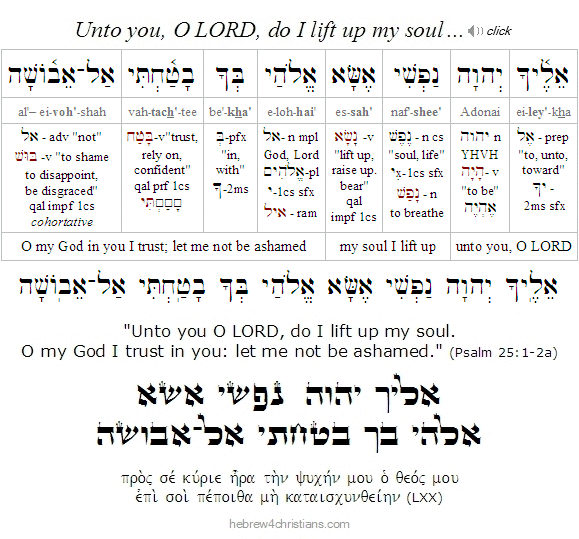 |
Teshuvah and Waste Places...
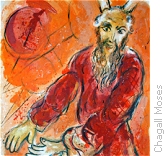
[ "When God wants to do an impossible task He takes an impossible man and crushes him" (Alan Redpath). The following considers the breaking of Moses in parashat Shemot. ]
01.05.24 (Tevet 24, 5784) Forty years before encountering the LORD in the burning bush, Moses was full of himself, a prince of Egypt "mighty in word and deed" who regarded himself as Israel's deliverer (Acts 7:22-25). But Moses' "Egyptian-styled" ego led him to regard murder and human uprising as the means of deliverance, and consequently God sent him into exile to think things through... It was there, in the waste places of the desert, that God's education began - the school of brokenness, teshuvah, and heart-listening... Only after this did God appear to him, calling out to the man who had lost all confidence in the flesh. Moses' humility mirrored the emptiness of the desert: "Who am I?" he protested, "I can't do this thing..." (Exod. 3:11). Exactly! Now he understood. Similarly, we must be careful not to regard ourselves as "strong," since the power of the flesh is useless for the purposes of heaven (Zech. 4:6). As it is written, "Thus says the LORD: 'Cursed is the man who trusts in man and makes flesh his strength, whose heart turns away from the LORD. He is like a shrub in the desert, and shall not see any good come. He shall dwell in the parched places of the desert, in an uninhabited salt land" (Jer. 17:5-6). It was only after Moses' question, "Who am I?" was answered by God's "I AM who I AM," that the "useless shrub" became aflame with power...
Moses' rod, which he had relied upon for years in the desert, was then transformed to be used as an instrument of Divine Power (Exod. 4:1-5). God entrusts the rod of His authority only in the hands of a truly broken man.... Similarly, though Moses was described as a man "mighty in word and deed," these were attributes of the flesh unrefined by the Spirit of God. Therefore, after being humbled in the desert, Moses confessed that he was kevad peh (כְבַד־פֶּה) - "heavy of mouth" - and kevad lashon (כְבַד לָשׁוֹן) "heavy of tongue," and unable to speak on behalf of the LORD. God then told him that He would "be with his mouth" to teach him what to say (Exod. 4:10-12). This likewise teaches that God entrusts the utterance of his word to the tongue of a genuinely broken man...
Hebrew Lesson
Psalm 119:71 Hebrew reading lesson (click):
A Divine Names Theology?
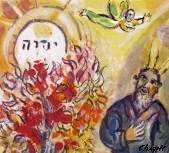
[ The following is related to our Torah for this week, Parashat Shemot... ]
01.04.24 (Tevet 23, 5784) This week's Torah portion is called Shemot (שְׁמוֹת, "names") because it begins with a list of the "names" of the descendants of Jacob who came to dwell in the land of Goshen: וְאֵלֶּה שְׁמוֹת בְּנֵי יִשְׂרָאֵל הַבָּאִים מִצְרָיְמָה / "These are the names of the sons of Israel who came to Egypt" (Exod. 1:1). Now while it's true that the Torah here lists the various names of the sons of Jacob, this portion of Torah more importantly refers the Names (plural) of the LORD God of Israel Himself.
To see this, let's consider the central story of this portion of Torah, namely, the commissioning of Moses at the Burning Bush (see Exod. 3:1-20). Note that the Torah states that it was the Angel of the LORD (i.e., Malakh Adonai: מַלְאַךְ יהוה) who appeared to Moses בְּלַבַּת־אֵשׁ מִתּוֹךְ הַסְּנֶה / "in a flame of fire out of the midst of a bush" (Exod. 3:1-2). But then the Torah goes on to say that the LORD (יהוה) saw Moses drawing near to the bush while God (i.e., Elohim: אֱלהִים) called out to him. God (i.e., Elohim) then commanded Moses to remove his sandals and identified Himself as the "God of Abraham (i.e., Elohei Avraham: אֱלהֵי אַבְרָהָם), the God of Isaac (i.e., Elohei Yitzchak: אֱלהֵי יִצְחָק), and the God of Jacob (i.e., Elohei Ya'akov: אֱלהֵי יעֲקב)." In this short and dramatic account we have several Names of God presented - the Angel of the LORD, the LORD, God (Elohim), and the "God of Abraham, the God of Isaac, and the God of Jacob" - all of which refer to the One true God!
When God commissioned Moses to be His shaliach (שָלִיחַ) - His emissary - to go before Pharaoh and lead the children of Israel back to the Promised Land, he objected that he was unfit for the task. He protested that he was kevad peh - "heavy of mouth" and kevad lashon, "heavy of tongue," and therefore unable to speak on behalf of the LORD (Exod. 4:10). God reminded him that He was the Creator of the mouth: "Who makes him mute, or deaf, or seeing, or blind? Is it not I, the LORD?" (Exod. 4:11).
Perhaps it was because Moses was "heavy of mouth" that he continued to object to God's decision to send him to to Egypt. After all, what would Moses say if he were asked what God's Name was? Perhaps Moses couldn't speak well enough to properly enunciate the Name? It is revealing to understand the LORD's reply: אֶהְיֶה אֲשֶׁר אֶהְיֶה / "Ehyeh Asher Ehyeh ('I will be what I will be'); and He said, "Say this to the people of Israel, 'I AM (אֶהְיֶה) has sent me to you.'" Then God (i.e., אֱלהִים) went on to "spell it out" for Moses: "Say this to the people of Israel, 'The LORD (יהוה), [namely] the God of your fathers, [namely] the God of Abraham (אֱלהֵי אַבְרָהָם), [namely] the God of Isaac (אֱלהֵי יִצְחָק), and [namely] the God of Jacob (אֱלהֵי יעֲקב), has sent me to you.' This is my name forever (זֶה־שְּׁמִי לְעלָם), and thus I am to be remembered throughout all generations" (Exod. 3:14-15).
Now I included the Hebrew text here to make it explicit that the distinct Names of God in this passage (i.e., יהוה, אֱלהִים, מַלְאַךְ יהוה, and so on) all refer to the One true LORD God of Israel, Maker of Heaven and earth. Indeed, the Torah makes it clear that the Name of the LORD YHVH (יהוה) is associated with the phrase ehyeh asher ehyeh (rendered as "I AM THAT I AM" in the KJV), which derives from the Qal imperfect first person form of this verb hayah (הָיָה): "I will be." In other words, there is a direct connection between the Name YHVH and Being and Reality itself. YHVH is the Source of all being and has being inherent in Himself (i.e., He is necessary Being). Everything else is contingent being that derives existence from Him. The name YHVH also bespeaks the utter transcendence of God. In Himself, God is beyond all "predications" or attributes of language: He is the Source and Foundation of all possibility of utterance and thus is beyond all definite descriptions.
In Jewish thought, the numerous names of God revealed in Scripture (Elohim, Shaddai, Adonai, the King of Israel, etc.) are thought to reveal different aspects or attributes of God's character and will to us. They function as "short hand" for descriptions of His essence - revelations of the hidden mystery and glory of the LORD. Since taking the name of the LORD "in vain" is one of the Ten Commandments, certain conventions are used to restrict the use of any of the Names of God. These conventions derive from Jewish law (halachah) that requires that secondary rules (גְּזֵרוֹת - "fences") be placed around a primary law to reduce the chance that the main law will be violated. For example, it is common practice to refer to God as "Hashem" (the Name) or to deliberately alter the sound or spelling of a divine name. The name Havayah (היוה) is also sometimes used to refer to YHVH, which is formed by transposing the letters of the Tetragrammaton.
According to Maimonides, one of the greatest Jewish theologians of the Middle Ages, all the various names and titles of God – with the possible exception of YHVH (יהוה) – are appellations that denote the Divine attributes. There is only one God revealed within Scripture and the multiplicity of names refers to different aspects of revelation rather than supposing that there is a multiplicity of deities. This idea also finds expression in the designation of God as Ein Sof (אֵין סוֹף), a theological term used to express that the essence of God is "without end" or "infinite." The revealed names of God therefore all represent some aspect of the divine nature to us in language that we can apprehend.
Some people seem to be preoccupied with finding out how to pronounce or utter the Sacred Name of the LORD (i.e., יהוה), though Jewish tradition maintains that the Divine Name is entirely ineffable and therefore intrinsically mysterious. Indeed, attaching a name to something "labels" it and claims authority over it (e.g., when David put his name over a conquered city). Since the LORD is utterly unique, without rival, the Creator and LORD who is answerable to no one, He cannot be named. The Jewish mystics say (surely as a form of hyperbole) that the proper Name of the LORD is all the letters of the Torah sounded at once -- without interruption. This is called the "304,805 letter Name of God." That is, string together all 304,805 letters of the Torah - from the first letter of Bereshit (Bet) through the last letter of Devarim (Lamed) - and "read" this as a single "Word." Of course the point here is that no one can do this. Indeed, the Angel of the LORD asks, "Why do you ask my name, seeing it is incomprehensibly wonderful?" (Judges 13:18).
Hebrew Lesson
Judges 13:18b Hebrew reading (and podcast):
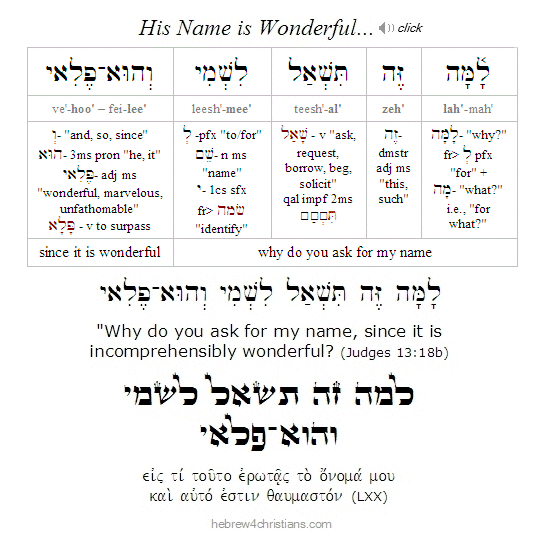 |
There are literally hundreds of different names, titles, metaphors, similes, allegories, and allusions given in the Hebrew Scriptures that refer to the one true God. Though YHVH is God's special Name, it is clearly a play on the verb "to be" (hayah). We do not "invoke" the Name like a magician might utter a "divine spell." God is near to us -- He's in the wind, in the heavens and earth, as close to you as your own heart (Deut. 30:14; Rom. 10:8). The hard part is to love and obey the LORD -- not to learn how to say His incomprehensible Name. Indeed, what good would it be to know how to properly pronounce the Sacred Name of the LORD if you do not love and obey Him? If you want to call upon the Name of the LORD, seek first His kingdom and His righteousness (Matt. 6:33). Learn to know Him as your Abba...
Kaddish and Providence...

[ "And now brothers, I will ask you a terrible question, and God knows I ask it also of myself. Is the truth beyond all truths, beyond the stars, just this: that to live without him is the real death, that to die with him the only life?" - Frederick Buechner ]
01.04.24 (Tevet 23, 5784) Since we are required to both affirm and to trust that "all things work together for good" (Rom. 8:28), we must bless God for perceived evil as well as for perceived good, because all circumstances of life come from the hand of the LORD our God (Job 2:10). Despite appearances that sometimes seem to the contrary, we believe that the all-powerful, supreme LORD has not abandoned the world but actively sustains it with benevolent intent. God presently and actively "upholds" all things ((φέρων τε τὰ πάντα ) by the word of his power (Heb. 1:3). When bad things happen to the righteous, we trust in God's personal care for their ultimate good, despite their present troubles. "We walk by faith and not by sight" (2 Cor. 5:7). As the prophet Job said: "Though he slay me, I will trust in Him" (Job 13:15). This is the heart behind the Kaddish, the mourner's prayer, that expresses acceptance of God's world, despite the pain, sorrow, loss, and so on.
The term hashgachah pratit (השׁגחה פרטית) refers to God's personal supervision of our lives (hashgachah means "supervision," and pratit means "individual" or "particular"). Since He is the Master of the Universe, God's supervision reaches to the smallest of details of creation - from subatomic particles to the great motions of the cosmos. God not only calls each star by its own name (Psalm 147:4), but knows each particular lily and sparrow (Matt. 6:28-30, 10:29). Each person created in the likeness of God is therefore under the direct, personal supervision of God Himself -- whether that soul is conscious of that fact or not. As Yeshua said, even the hairs on your head are all numbered (Matt. 10:30). Indeed, the God of Israel is called אלהי הרוּחת לכל־בּשׂר / Elohei ha-ruchot lekhol-basar: "The God of the spirits of all flesh" (Num. 16:22), and that means He is LORD even over those who vainly attempt to suppress His Presence and reality. "Can a man hide himself in secret places so that I cannot see him? declares the LORD. Do I not fill heaven and earth?" (Jer. 23:24).
The Talmud says that when Moses asked God, "Please show me your glory" (Exod. 33:18), he was asking for God's vindication in the light of the harrowing question: "Why do the righteous suffer while the wicked prosper?" Moses was not given an explicit answer, and some of the sages said he wrote the enigmatic Book of Job to demonstrate that the question can only be reduced to God's inscrutable will: "Where were you when I laid the earth's foundation?" (Job 38:4). In other words, the question can only be answered by the One who knows the beginning from the end, the Infinite One who sees the implications and concatenation of all things. As finite beings, we see only a fraction of the big picture, and therefore we must yield our trust to the Wisdom and Power of Almighty God (Deut. 32:4).
It is written, "Your eyes saw me when I was inside the womb; in your scroll everything was written, my days were ordained before they came into existence" (Psalm 139:16). In light of God's providential ordering of our lives, Blaise Pascal asked, "What is left for us but to unite our will to that of God himself, to will in him, with him, and for him the thing that he has eternally willed in us and for us." The Mishnah says it this way: "Do His will as if it was your will that He may do your will as if it was His will" (Avot 2:4). In other words, what else can we do but learn to trust, accept, and to say "yes" to life -- even if at times we may feel like orphans, lost in a fatherless world... All our days are recorded in God's scroll.
Hebrew Lesson
Psalm 139:16b reading (click):
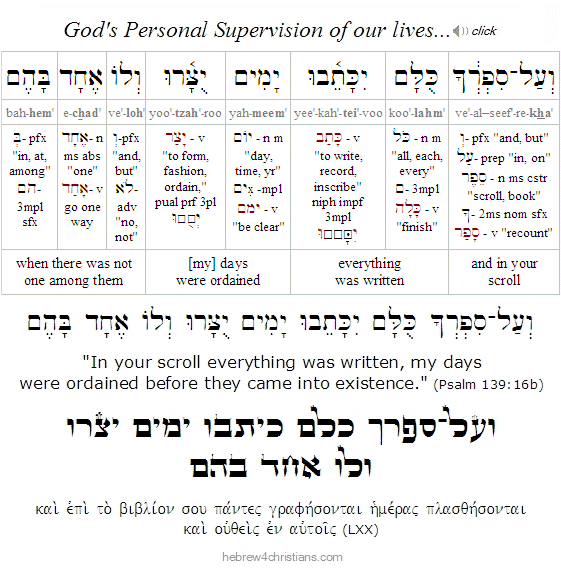 |
There is a dark temptation to refuse to accept God's sovereign will, which includes objecting to his "tolerance" of evil (for a season) until his greater plan for the redemption is fully manifest... We need to be careful lest we become hardhearted, bitter, and despair over the purpose for life - like Ivan in The Brother's Karamazov (Dostoevsky) who, though he intellectually gave assent to God's providential plan, refused to accept it because of the unspeakable cruelty and senseless suffering he saw in the world. His disillusionment moved him to say to his sincerely devout brother: "It's not God that I don't accept, Alyosha, only I most respectfully return him the ticket." How tragic that the heart can turn away from God because the present moment seems incomprehensible and broken.... How many people have so despaired when, if they had but held on for awhile longer, they may have received solace and comfort? For me it helps to remain humble, to confess my ignorance of much, and to "remember the future" wherein glory and beauty will be soon be revealed (Psalm 31:19).
Hebrew Lesson
Psalm 31:19a reading (click):
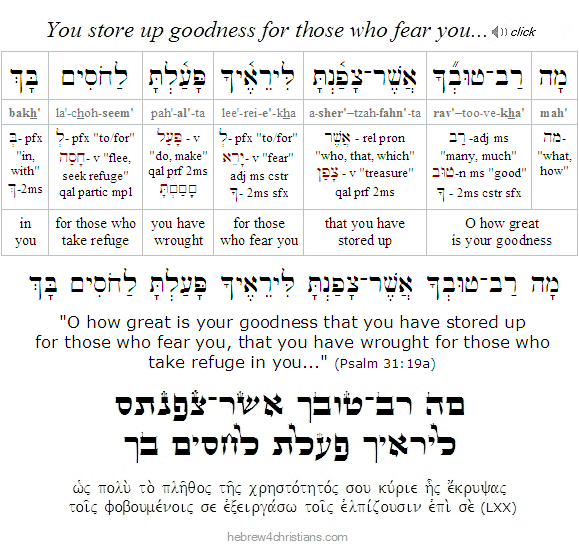 |
For more on this, see the meditation entitled "Paradox and Presence."
Out of the Depths... ממעמקים

01.02.24 (Tevet 21, 5784) In the midst of his struggle, King David asked the LORD: "How long shall I take counsel in my soul, having sorrow in my heart daily?" (Psalm 13:2). There may be times when we lack eitzah (עֵצָה), or clear counsel to follow, and this can make us feel uncertain, alone, and even desperate. The sages advise in this case that you must cry out to God over and over, casting your burden upon him, and relying on Him alone...
Cast your "fate" (i.e., goral: גּוֹרָל) before the LORD, trusting in his providential care (Psalm 16:5); unclench your fists and let go of all your desires and fears – those dark forces that hold you captive – by opening your heart to the Holy Spirit. There is no fear in God's love (1 John 4:18), and that means you are set free to confess the truth of your struggle before the One who heals and delivers you.
As long as you think your own counsel will be your deliverance (יְשׁוּעָה), however, there will be "sorrow in your heart daily," since there is no true salvation apart from the grace and power of God. That is why David finally affirmed, "My heart shall rejoice in Your salvation" (Psalm 13:5) rather than "my heart shall rejoice in my salvation," since salvation is of the LORD (לַיהוָה הַיְשׁוּעָה) and not from the counsel of the soul...
Hebrew Lesson
Psalm 13:5 reading (click):
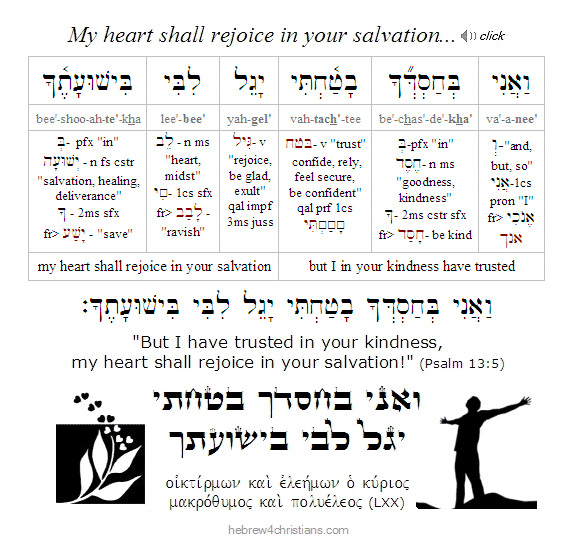 |
Out of the Straits...
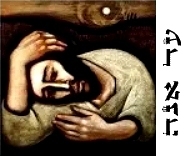
[ "God, Who is everywhere, never leaves us. Yet He seems sometimes to be present, sometimes to be absent. If we do not know Him well, we do not realize that He may be more present to us when He is absent than when He is present." - Thomas Merton ]
01.02.24 (Tevet 21, 5784) The name for ancient Egypt in Hebrew is "mitzrayim" (מִצְרַיִם) a word that can be translated as "straits" or "narrow places" (i.e., -מ, "from," and צַר, "narrow"), suggesting that "Egypt" represents a place of constriction, tribulation, oppression, slavery, and despair. The Hebrew word for salvation, on the other hand, is "yeshuah" (יְשׁוּעָה), a word that means deliverance from restriction, that is, freedom and peace. As it is written: "From my distress (מִן־הַמֵּצַר), i.e., from "my Egypt," I cried out to the LORD; the LORD answered me and set me in a wide open place" (Psalm 118:5).
But why, it may be asked, did God tell Jacob: "Do not be afraid to go down to Egypt" (Gen. 46:3)? Why did God allow this excursion into "heavy darkness" that Abraham clearly foresaw (Gen. 15:12-13)? What is there about "Egypt" that prepares us to take hold of our promised inheritance? Joseph become a prince of Egypt; however, he was still captive to Pharaoh, and later, after he died, a "new Pharaoh arose" that did not acknowledge his contribution to Egyptian history (Exod. 1:8). All that remained of Joseph were his bones – a chest of bones that were carried by Moses (and later buried by Joshua in Shechem). The "bare bones" of Joseph represented the essence of his faith, as he foresaw the time when God would rescue the family from Egypt and raise him up in the land of promise (Gen. 50:24-26; Heb. 11:22).
A general principle of spiritual life is that the "the way up is the way down" (John 12:24). As Yeshua said, "Whoever would be first among you must be slave of all" (Mark 10:44). Becoming nothing (i.e., ayin) in this world is the condition for seeing something in the world to come. Unless a seed falls to the ground it abides alone (John 12:24). But we become "nothing" by trusting in the promise of God, not by trying to do it ourselves... This is not another venture of the ego. Life in the Spirit means trusting that God will do within you what you cannot do for yourself... We can only take hold of what God has done for us by "letting go" of our own devices (Phil. 2:13). When we let go and trust, we will be transformed, carried by the "Torah of the Spirit of life" (i.e., תּוֹרַת רוּחַ הַחַיִּים, Rom. 8:2), The way is not trying but trusting; not struggling but resting; not clinging to life, but letting go...
God's way of deliverance is entirely different than man's way. Man tries to enlist carnal power in the battle against sin (i.e., religion, politics, etc.), but God's way is to remove the flesh from the equation. The goal is not to make us stronger and stronger, but rather weaker and weaker, until the ego is crucified and only the sufficiency of the Messiah remains. Then we can truly say, "I have been crucified with Messiah. It is no longer I who live, but the Messiah who lives in me. And the life I now live in the flesh I live by faith in the Son of God, who loved me and gave himself for me" (Gal 2:20). The word "Hebrew" (עִבְרִי) means one who has "crossed over" (עָבַר) to the other side, as our father Abraham did when he left the world of Mesopotamia (Gen. 14:13). Likewise it is on the other side of the cross that we experience the very power that created the universe "out of nothing" (i.e., yesh me'ayin: יֵשׁ מֵאַיִן) and that raised Yeshua the Messiah from the dead.
Hebrew Lesson
Psalm 118:5 Hebrew reading (click):
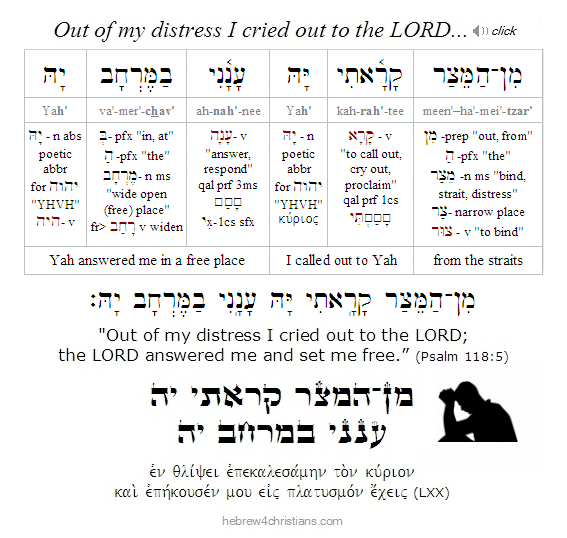 |
New Pharaoh's Dream...
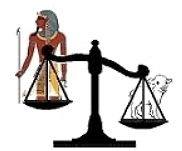
[ The following is related to our Torah reading for this week, Parashat Shemot... ]
01.02.24 (Tevet 21, 5784) According to midrash, just as Pharaoh during the time of Joseph was troubled by his dreams (Gen. 41:1-7), so was the "new king" that arose during the time of Moses (Exod. 1:8). In the new Pharaoh's dream, an old man was standing before him as he sat on his throne, holding a balance in his hand. The old man placed all the nobles and governors of Egypt on one side of the balance, and on the other side, he placed one small lamb. To Pharaoh's astonishment, however, the lamb outweighed all the leaders of Egypt! When the king asked his advisors to interpret the dream, they said it foretold of a coming king who would overthrow the kingdom of Egypt and set the Israelites free. This coming one would excel in wisdom and his name would be remembered forever as the Savior of Israel.
Of course the rest of the Book of Exodus is essentially God's interpretation of the new Pharaoh's dream, as the great events of the Exodus would reveal. The LORD God of Israel forewarned this king that Egypt would come into judgment by the Lamb of God... Indeed, the only way to escape this judgment and the wrath of God was by being covered by the sacrificial blood of the lamb... The Lamb of God is central to Israel's deliverance and becomes the focal point of the revelation of the sanctuary later given at Sinai.
Israel was redeemed from Egypt by trusting in the promise of their deliverance, as it is written, "and the people believed" (וַיַּאֲמֵן הָעָם) ... and bowed their heads and worshiped" (Exod. 4:31). Recall that the blood of the korban Pesach - the Passover lamb - was to be smeared on the two sides and top of the doorway, resembling the shape of the letter Chet (ח). This letter, signifying the number 8, is connected with the word חי (chai), short for chayim (life). The blood of the lamb (דַּם הַשֶּׂה) not only saves from the judgment of death, but it also is the means of imparting divine life and power...
Hebrew Lesson
Psalm 72:18 reading (click):
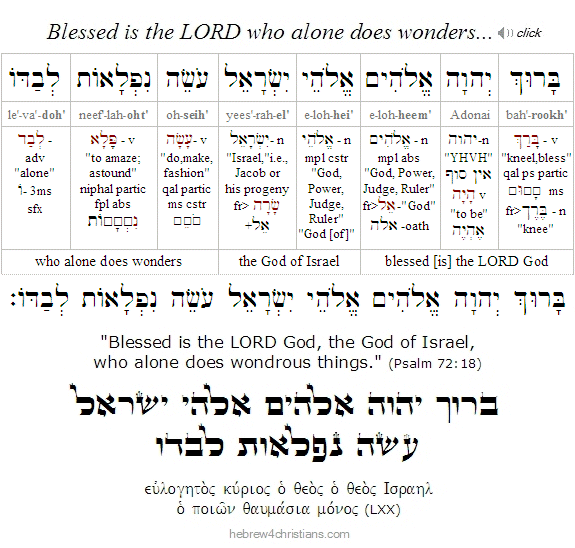 |
The Parable of the Sower...
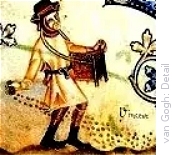
[ A meditation for the new year, chaverim... ]
01.01.24 (Tevet 20, 5784) Simply knowing about God is insufficient for a transformed life; something more is needed, namely, receptivity of the heart - a sense of concern, a hunger and a thirst for life, and the willingness to believe in love. Yeshua taught that the spiritual condition of our heart is revealed by how we hear. Without charity and a deep sense of concern, loss will inevitably occur. He warned us: "Take heed therefore how you hear: for whoever has will be given more, but whoever does not have, even what he thinks he has will be taken from him" (Luke 8:18). Just as "the good eye" (הָעַיִן הַטּוֹבָה) that searches for what is good, so "the good ear" (הַאֹזֶן הַטּוֹבָה) listens to the word of hope; and just as "the evil eye" (הָעַיִן הָרָעָה) searches for what is evil, so "the evil ear" (הַאֹזֶן הָרָעָה) attends to the message of loss and despair. We receive what seek. As we inwardly receive the truth of Yeshua, more truth is revealed; but if we resist, untruth will take root and grow...
Yeshua often employed parables (משׁלים), or analogical stories, in his teaching because they simultaneously conceal and reveal spiritual truth. A parable obscures the truth to those who don't really want it, so that "seeing they may not see, and hearing they might not understand" (Luke 8:9-10; Isa. 6:9-10), and yet it reveals truth to the humble of heart. Since Yeshua's whole life was a parable of sorts - a "disguise" that led to the victory of our deliverance (Phil. 2:7) - it is not surprising that he regularly used "figures of speech" to provoke people to examine their own heart condition and the quality of their faith... In this connection note that Yeshua never explained the "mysteries of the kingdom of God" directly to the crowds, nor did He ever pander to the crowd's clamor or interests. God's word is freely "sown" to all, but it is received only by those who are willing to hear. The message is always directed to the individual willing to follow Him -- to the one who has "ears to hear."
For example, the famous "Parable of the Sower" (מָשָׁל לְזוֹרֵעַ; Luke 8:4-8) teaches us that God is like a farmer who sows seed upon the "soil" of the human heart, the quality of which may be hard, shallow, choked, or good:
- A "hard heart" (לֵב קָשְׁה) is likened to impenetrable soil that repels the "seed" of the promise of God (ὁ λόγος τοῦ θεοῦ, Luke 8:11). Because of bitterness, a person can become indifferent and numb inside, and this heart condition enables the devil to snatch the seed of hope from the heart like a ravenous bird (Luke 8:12).
- A "shallow heart" (לֵב רָדוּד) is likened to topsoil that overlays bedrock. At first the soil receives the seed and quickly begins to grow, but since there is no depth of soil, the growth fails to take root and the growth withers for lack of nutrients and moisture. When tested, the shallow heart reveals its lack of commitment and does not persevere (Luke 8:13).
- A "choked heart" (לֵב חָנוּק, or לב חָסוּם) is likened to weedy soil that hides other roots that exhibit "thorns," namely worldly fears, the desire for riches, and the pursuit of comfort or pleasures. Such people are double-minded and their spiritual life becomes obstructed, throttled by busyness, distracted by desires for comfort, security, and worldly vanities. They are full of inner conflict and despair and consequently become stunted in their growth (Luke 8:14).
- Finally, a "good heart" (לב טוב) is likened to tilled and receptive soil that receives the seed to yield an abundant harvest: "yielding thirty, sixty, or a hundredfold." Because the righteous honor the seed and nurture its presence, the hidden power of the Life is powerfully released (Luke 8:15). They are also likened to a tree planted by rivers of living water that bring forth fruit in their season (Psalm 1:3). In this connection it is helpful to remember that fruit does not immediately crop up but requires time and its own season... The process of spiritual growth is ultimately mysterious and divine: "The kingdom of God is like someone who spreads seed on the ground. He goes to sleep and gets up, night and day, and the seed sprouts and grows, though he does not know how. By itself (αὐτομάτη, "automatically") the soil produces a crop, first the stalk, then the head, then the full grain in the head. And when the grain is ripe, he comes in with his sickle because the harvest has come" (Mark 4:26-29). With God all things are possible, and the life of God is a miracle that comes from God's own source of Life. It is the fruit of the Spirit, after all, and not the result of human effort or moral reformation...
So the "parable of the sower" teaches us that how we hear will determine the quality of the ground (or basis) of our spiritual life. If we are honest with ourselves, we will see our own hardness, shallowness, and selfishness in contrast to the fruitfulness marked by the good heart, and this should provoke us to seek God for help... Again, only a new heart (לֵב חָדָשׁ) created by power of God's Spirit can possibly yield the fruit of the Spirit (פְּרִי הָרוּחַ). "Take care then how you hear, for to the one who has, more will be given, and from the one who has not, even what he thinks that he has will be taken away" (Luke 8:18).
Believers are likened to earthen vessels that hold the treasure of God's truth, and therefore they are in constant need of God's grace to persevere. Therefore Yeshua told his disciples: "I am the true vine (הַגֶּפֶן הַאֱמִיתִית), and my Father is the gardener (הַכּוֹרֵם). Every branch in me that does not bear fruit he takes away, and every branch that does bear fruit he prunes, that it may bear more fruit" (John 15:1-2). Note that it is the healthy branch that will be cut back - not the withered one that will be altogether removed – and this purging process may be painful at times. The heavenly Gardener's goal is for the fruitful branch to reveal more and more the connection to the heart of the Vine, so that God is glorified (see John 15:8). The end here is the beatific vision: "Blessed are the pure in heart, for they shall see God" (Matt. 5:8). The goal of "purging" is fruitfulness and blessing, but the agency is not the will of man but the power of God. You are made "clean" through the word of God spoken within your own heart (John 15:3). This is the acceptance of the Messiah's life within you. Your sanctification, however, depends on your communion with God, staying connected to what is real, vital, and the core truth of God's Presence and love, the ultimate Reality of Life itself.
In light of these things I hope we might better appreciate and understand Yeshua's admonition: "Abide in me, and I in you. As the branch cannot bear fruit by itself, unless it abides in the Vine, neither can you, unless you abide in me. I am the vine; you are the branches. The one who remains in me – and I in him – bears much fruit, because apart from me you can accomplish nothing" (John 15:3-5). Our connection to Yeshua is intended to bear fruit that glorifies God, but if we refuse to find life in him, we will eventually wither and die (John 15:6). We find sustenance and healing only as we remain connected to Messiah who is the Source and Conduit of life (מְקוֹר וְאת הַצִּינוּר שֶׁל חַיִּים), for he alone is the Savior and LORD. True life grows out a heart connection with Him, and without that connection our lives become vain and will yield no eternal significance. Nevertheless we must remain encouraged, friend, since God calls us to Himself. This is "the work of faith." Look to heavenly reality and not to the vanity and deceits of this world (Col. 3:1-4). Find life in connection with Yeshua, drawing strength and vitality from your relationship with Him. The fruit of the Spirit is produced as we open our hearts and yield ourselves to the love and presence of the Lord. May you grow in grace and be fruitful in God's love. Amen.
Hebrew Lesson
John 15:1 reading (click):
Hope not deferred...
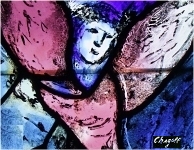
01.01.24 (Tevet 20, 5784) From our Torah portion last week (i.e., Vayechi) we recall the testimony of our father Jacob: "The days of the years of my sojourning are 130 years. Few and evil have been the days of the years of my life.." (Gen. 47:9). Note here that Jacob regards "life" in this vale of tears as a time of "sojourning" (מָגוּר) or pilgrimage as he wanders about until he reaches his true homeland, namely "the place" (הַמָּקוֹם) of the Foundations of God's Presence (see Heb. 11:10). As Jacob exclaimed from his deathbed: "For your salvation I have hoped, O LORD" (לִישׁוּעָתְךָ קִוִּיתִי יְהוָה; Gen. 49:18). And to you, dear friend, I plead: press on! "Surely there is a future, and your hope will not be cut off" (Prov. 23:18). Stay strong and focused, chaverim: the hour draws near...
Hebrew Lesson
Prov. 23:18 reading (with comments):
Blessing for this Hour...
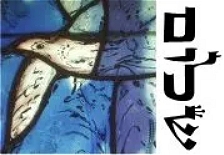
01.01.24 (Tevet 20, 5784) At the outset of the new civil year, let us recall the ancient priestly blessing, the great expression of hope and grace that transforms us into "name bearers" of God. The blessing of the LORD guards us from illusion, directing our hearts to focus on what matters most; His radiance changes us, revealing the miracle of grace. As God "lifts up his face," he discloses his Presence within all things, and imparts to us his healing peace. God's Name is "put upon" us so that we become vessels that carry redemptive love and healing to the world. We are endowed with divine energy to be made fruitful; we are empowered to serve God in the truth. The consciousness of our blessedness touches every moment, and we begin to see all of life as sanctified, sacred, full of wonder and meaning.
יְבָרֶכְךָ יְהוָה וְיִשְׁמְרֶךָ
יָאֵר יְהוָה פָּנָיו אֵלֶיךָ וִיחֻנֶּךָּ
יִשָּׂא יְהוָה פָּנָיו אֵלֶיךָ וְיָשֵׂם לְךָ שָׁלוֹם
ye·vah·re'·khe·kha' · Adonai · ve·yeesh'·me·re'·kha
yah·eir · Adonai · pah·nav · e·ley'·kha · vee·khoon·ne'·kah
yee·sah · Adonai · pah·nav · e·ley'·kha · ve·yah·seim · le·kha · shah·lohm

"May the LORD bless you and keep you;
May the LORD shine his face upon you and be gracious to you;
May the LORD lift up his face upon you and give you his peace."
(Num. 6:24-26)

Hebrew Study Card
Note that the text of this great "priestly blessing" (i.e., birkat kohanim) begins with three words, is comprised of three parts, invokes the divine Name three times, and is therefore quite appropriately called "the three-in-one blessing." Note further that each of the three phrases begins with the Hebrew letter Yod (י), suggesting the threefold hand of YHVH (יהוה) that touches you: the Father blesses you (יְבָרֶכְךָ); the Word of God shines upon you (יָאֵר), and the Spirit of God lifts you up and carries you in the way of life (יִשָּׂא). The threefold blessing is One, of course, just as Adonai echad: יְהוָה אֶחָד, the LORD is One (Deut. 6:4), and the essence of the blessing is to partake of healing and wholeness as expressed in the Hebrew word shalom (שָׁלוֹם). Amen. Without oseh shalom, without peace made within our hearts, any other blessings are only apparent and without substance...
Hebrew Lesson
Numbers 6:24-26 reading (click):
About the Secular New Year...
Like most things Jewish, the idea of the "new year" is not simple... First there is the New Year of spring (Rosh Chodashim) on the first day of the month of Passover, and then there's the New Year of the fall (Yom Teruah) on the first day of the seventh month. The two halves of the year mirror one another and are prophetic regarding the Messiah's two advents.
The "civil New Year" the world observes derives from the pagan sources. Ancient Rome used the "Julian calendar," and January 1st was dedicated to Janus, the "god" of gateways and beginnings, and after whom the month of "January" is named. For more on this tap the following link on the secular calendar:
<< Return
|
|











